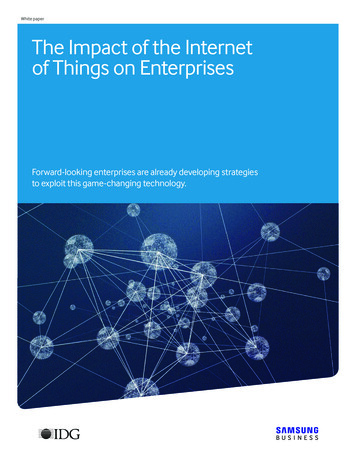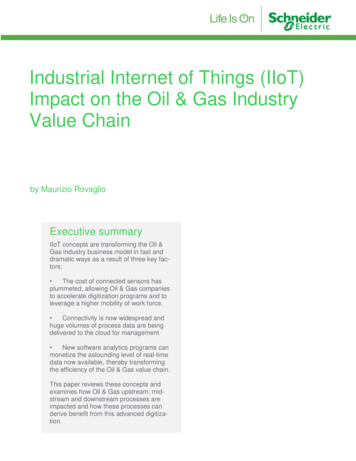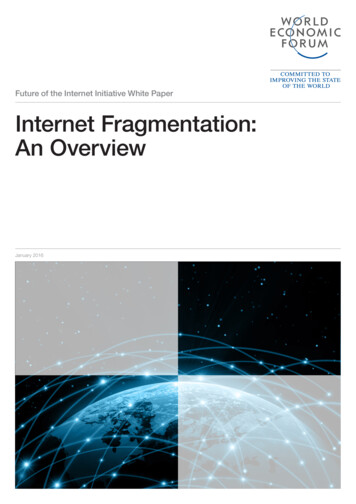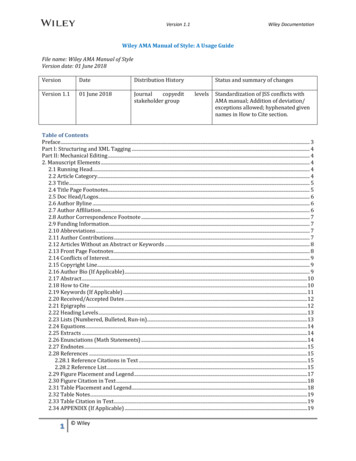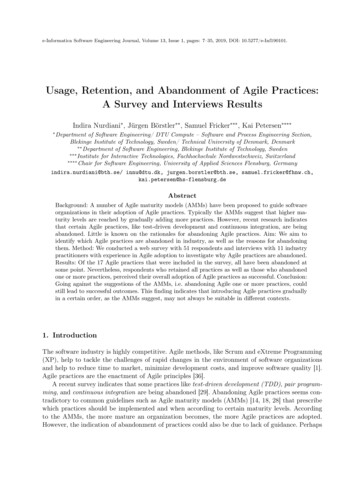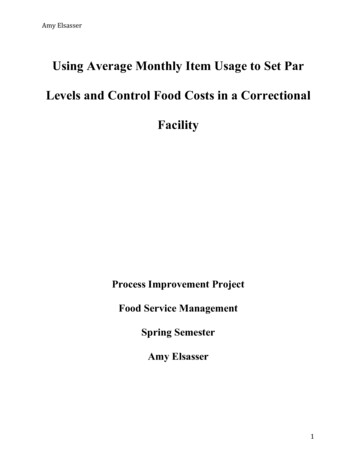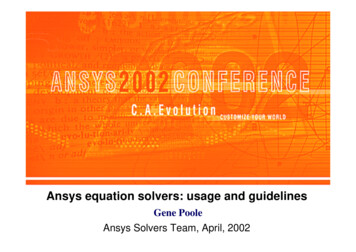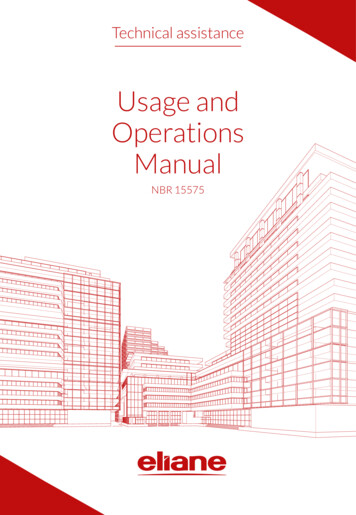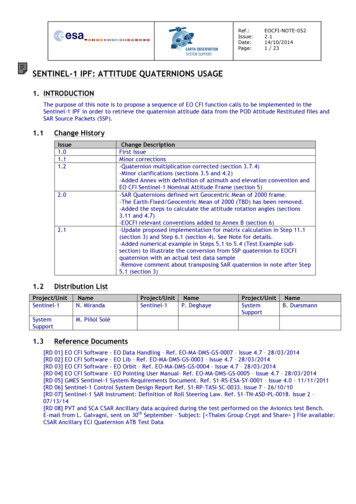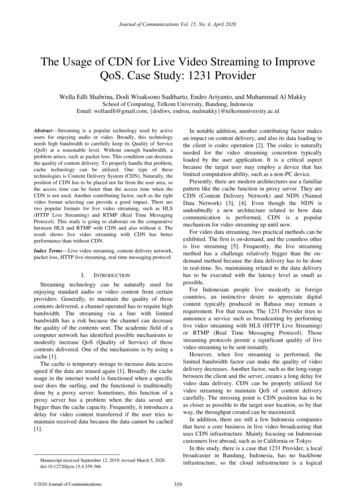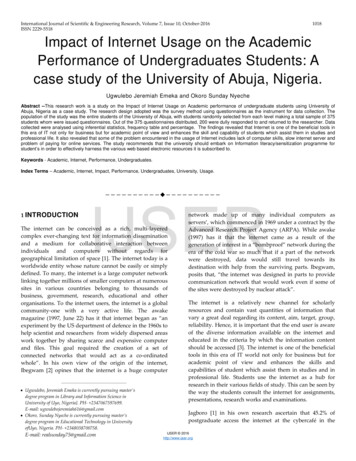
Transcription
International Journal of Scientific & Engineering Research, Volume 7, Issue 10, October-2016ISSN 2229-55181018Impact of Internet Usage on the AcademicPerformance of Undergraduates Students: Acase study of the University of Abuja, Nigeria.Ugwulebo Jeremiah Emeka and Okoro Sunday NyecheAbstract --This research work is a study on the Impact of Internet Usage on Academic performance of undergraduate students using University ofAbuja, Nigeria as a case study. The research design adopted was the survey method using questionnaires as the instrument for data collection. Thepopulation of the study was the entire students of the University of Abuja, with students randomly selected from each level making a total sample of 375students whom were issued questionnaires. Out of the 375 questionnaires distributed, 200 were dully responded to and returned to the researcher. Datacollected were analysed using inferential statistics, frequency table and percentage. The findings revealed that Internet is one of the beneficial tools inthis era of IT not only for business but for academic point of view and enhances the skill and capability of students which assist them in studies andprofessional life. It also revealed that some of the problem encountered in the usage of Internet includes lack of computer skills, slow internet server andproblem of paying for online services. The study recommends that the university should embark on Information literacy/sensitization programme forstudent’s in order to effectively harness the various web based electronic resources it is subscribed to.Keywords - Academic, Internet, Performance, Undergraduates.Index Terms – Academic, Internet, Impact, Performance, Undergraduates, University, Usage.IJSER—————————— ——————————1 INTRODUCTIONThe internet can be conceived as a rich, multi-layeredcomplex ever-changing text for information disseminationand a medium for collaborative interaction betweenindividuals and computers without regards forgeographical limitation of space [1]. The internet today is aworldwide entity whose nature cannot be easily or simplydefined. To many, the internet is a large computer networklinking together millions of smaller computers at numeroussites in various countries belonging to thousands ofbusiness, government, research, educational and otherorganisations. To the internet users, the internet is a globalcommunity-one with a very active life. The awakemagazine (1997, June 22) has it that internet began as “anexperiment by the US department of defence in the 1960s tohelp scientist and researchers from widely dispersed areaswork together by sharing scarce and expensive computerand files. This goal required the creation of a set ofconnected networks that would act as a co-ordinatedwhole”. In his own view of the origin of the internet,Ibegwam [2] opines that the internet is a huge —— Ugwulebo, Jeremiah Emeka is currently pursuing master’sdegree program in Library and Information Science inUniversity of Uyo, Nigeria]. PH- 2347067597699.E-mail: ugwulebojeremiah616@gmail.com Okoro, Sunday Nyeche is currently pursuing master’sdegree program in Educational Technology in UniversityofUyo, Nigeria. PH- 2348038700758.E-mail: realsunday75@gmail.comnetwork made up of many individual computers asservers’, which commenced in 1969 under a contract by theAdvanced Research Project Agency (ARPA). While awake(1997) has it that the internet came as a result of thegeneration of interest in a “bombproof” network during theera of the cold war so much that if a part of the networkwere destroyed, data would still travel towards itsdestination with help from the surviving parts. Ibegwam,posits that, “the internet was designed in parts to providecommunication network that would work even if some ofthe sites were destroyed by nuclear attack”.The internet is a relatively new channel for scholarlyresources and contain vast quantities of information thatvary a great deal regarding its content, aim, target, group,reliability. Hence, it is important that the end user is awareof the diverse information available on the internet andeducated in the criteria by which the information contentshould be accessed [3]. The internet is one of the beneficialtools in this era of IT world not only for business but foracademic point of view and enhances the skills andcapabilities of student which assist them in studies and inprofessional life. Students use the internet as a hub forresearch in their various fields of study. This can be seen bythe way the students consult the internet for assignments,presentations, research works and examinations.Jagboro [1] in his own research ascertain that 45.2% ofpostgraduate access the internet at the cybercafé in theIJSER 2016http://www.ijser.org
International Journal of Scientific & Engineering Research, Volume 7, Issue 10, October-2016ISSN 2229-5518university while only 8.2% use the library internet facilities.A greater percentage (38.24%) does that only on monthlybasis while 39.7% spend one hour on each visit. Theinternet provides several opportunities for the academia. Itis a mechanism for information dissemination and amedium for collaborative interaction between individualsand their computers without regard for geographicallimitation of space [1]. The internet is the world’s largestand most widely used network.The internet appearance intertiary education was used as tools for researchers tocommunicate and share project work. Today the educationdomain is still one of the largest contributors to the internet[1]. Since the inception of the ICT, the internet has acted asa store house of information. Students have been able tohave a wide range of information round the clock andround the globe. Also effective use of the internet leads today-to-day update of the happenings in our society and thisaffects the academic performance of students in variousfields. This has helped to increase the information quotientof students during studying, learning and research.Studies by Oyegun[4] revealed that the internet has manybenefit to the academic cycle; these include provision ofround-the-clock access to a wide variety of informationsources globally and the ability to discuss and shareexperience with colleagues to be able to derive maximumbenefits from the attributes of ICT. Ojekun [5] alsoconfirmed as he discovered that student at University ofBotswana lacked skills and this greatly impended theirmeaningful exploration of the internet.1019of vast amount of information sources via the mediation ofinternet access. Resources that the library makes availablemust be integrated with one another and within the libraryenvironment and library services must support learningand research behaviours of its users.Furthermore, users want to access and use items from morethan one content provider; also they ultimately interactwith various user interfaces but even then, each service hasa different user interface for discovery, with its unique setof “presentation services” that the user must learn andunderstand [9]. Walker [9] further stated that E-accessopens up greater opportunities for people to find and get toan increasing corpus of knowledge. Search engines such asGoogle, Msn and Yahoo are now targeting the traditionallibrary user; and libraries are under increasing pressure todevelop and offer new paradigms for discovery that meetthe changing expectations of end users.With increasing impact of information and communicationtechnologies on higher education, all those concerned withhigher education are attempting to grasp how ICT couldhelp in modernizing the process of teaching, learning andresearch. With the advent of the internet, the followingdilemma arises in the educational system: Leaner is notdependent on teacher for interaction; and teachers can givelecturers virtually to unknown learners. So in this era,teachers and students can carry forward their work on theinternet in ways that are similar to and tightly intertwinedwith the traditional ways that they learn, teach and study inlibraries, classrooms, laboratories, seminars, conferencesand so on. The internet can provide access to essentiallyunlimited resources of information not conventionallyobtainable through other means. The internet has brokendown barriers of communication access from anywhere inthe world. It is fast, reliable and does not have restrictionson content or format. It also has unlimited range of facilitieswhich assist users to access almost infinite information onthe net. It offers the opportunity for access to up-to-dateresearch reports and knowledge globally. It has thusbecome an important component of electronic services inacademic institutions. Hence the internet has become aninvaluable tool for learning, teaching and research(including collaborative research).IJSERThe internet now represents one of the most successfulexamples of the benefits of sustained investment andcommitment to research and development of informationinfrastructure [6]. The internet is a valuable source ofinformation used by student in projects and assignments.With over 50million websites on the net, the chances arethat information on any subject however obscure can befound using appropriate search tools. It also serves as auseful tool for lecturers in helping to prepare lesson plansusing a number of sites dedicated to providing educationalmaterial. There are great possibilities for higher educationat all levels through the use of internet because curriculacan be developed collaboratively and educational materialsdistributed and updated more cheaply, offering additionalways for students to interact with their study materials aswell as their instructors [7]. Another importance of theinternet is that it affords students (all over the world butmore beneficial to those in developing countries) theopportunity to access a large pool of data which could helpreduce the information gap resulting from thedisadvantages of the educational opportunities [8]. TheUniversity library has a role to play through the provisionPrior to the use of ICT for acquisition, processing anddissemination of information, university teaching, learningand research were restricted to student’s dominicalinstitutions library or by extension those materials madeavailable through inter-lending [10]. Akintunde [11] ascited in Anunobi [10] asserts that any attempt to havemeaningful academic communication can be successfulonly with the use of ICT which presents information in realIJSER 2016http://www.ijser.org
International Journal of Scientific & Engineering Research, Volume 7, Issue 10, October-2016ISSN 2229-5518time and space. No wonder youngsters, especially studentsand researchers spend most of their time in the cybercafé.Where the latter is not available in the universitycommunity, they risk travelling a further distance totransact one business or another in the internet [10].1.1.2 Statement of the Problem4.The lack of funds for effective running of the universitiesand especially their libraries has adversely affectedadequate provision of modern books, updated literatematerials and journals where available, are now expensiveas warranted by the economic recession, global politicalcrises and currency devaluation compounded by theinformation explosion that we have witnessed in the globalelectronic village that the world has turned to. In view ofthose afore stated problems, Nigerian students have nowturned their attention to the use of internet for the purposeof studying, conducting research and obtaining generalinformation. Therefore, with more attention given to theinternet as a result of its numerous benefits, students whohave access to this technology may lose some level ofsignificant interest in using the library. The study thereforeis an attemptto access the effectiveness of the use of internetservices and how it affects student’s academicperformances.2.3.5.6.1020It was assumed that students use the internet allweekdays except weekends.It was assumed that students prefer to browse inthe cybercafé than in the library.It was assumed that student use the internet forsocial networking.It was assumed that the Google search is the mostused internet service by students.It was assumed that the internet has affected thestudents positively towards their educational goal.It was assumed that illiteracy is the problem facedby students most in internet use.1.6 Significance of the StudyThe study could be beneficial for students as well as for theinstitution. The valuable feedback gotten from respondentsshould help students to realise the benefits of internet intheir education. Institutes can invest more in internetfacilities to enhance the academic performance of theirstudent and produce better results. Note that the relevanceof internet facilities is measured by how effective, sufficientand accessible it is to students and users. The research willalso provide in-depth insight into the various internetfacilities and how students can be able to use them toimprove academic performance.1.7 Scope and Delimitation of the StudyThe self-report criterion is a limitation. Future researchshould employ more objective measures of internet use.This study covers all regular undergraduate students inUniversity of Abuja. These are 100 - 400 levels studentincluding 500 levels law. The study therefore excludescentre for distance learning and continuing education (CDLand CE) students and sandwich students. Also, the study isnot restricted to any gender. It includes both male andfemale, and undergraduates at all level of study.IJSER1.3 Objective of the StudyThe main objective of this study is to find out the use ofinternet services and how it affects student’s performance.Specifically, the aims of the study are to1. Find out the frequency of internet use.2. Find out the most preferred location of internetuse.3. Find out the purposes for browsing the internet.4. Find out the most used internet service.5. Find out the influence of internet use on academicperformance.6. Find out the problems faced by students duringinternet use.1.4 Research QuestionsThe following research questions have been formulated toguide this study.1. What is the frequency of internet use among thestudents?2. What is the most preferred location of internet?3. What are the purposes for browsing the internet?4. Which is the most used internet service?5. Does internet services influence student’s academicperformance?6. What are the problems faced by students in usinginternet services?1.5 Basic AssumptionsThe following are the assumptions of the researcher.2LITERATUREREVIEW2.1Concept of InternetThe internet according to Wells [12] is a computer mediatedcommunication tool, providing the individual with accessto a broad spectrum of information and uniquecommunication technologies. The internet is a globalsystem for interconnected computer networks that use thestandard internet protocol suite to serve billions of usersworldwide. It is a network of networks that consist ofmillions of private, public, academic, business andgovernment network of local to global scope that are linkedby a broad array of electronic, wireless and opticalnetworking technologies. The internet carries a vast rangeof information resources and services such as the interlinked hypertext documents of the World Wide Web(WWW) and the infrastructure to support electronicIJSER 2016http://www.ijser.org
International Journal of Scientific & Engineering Research, Volume 7, Issue 10, October-2016ISSN 2229-5518mail.Madu and Adeniran [13] noted that the internetdeveloped from a United States Department of Defenceproject, during the cold war years. Precisely, the internetstarted in 1969 under a contract by the Advanced ResearchProject Agency (ARPA) whose major objective was toconnect major computers at the universities in the SouthWestern United State.The origin of the internet dates back to research of the 1960commissioned by the United States government incollaboration with private commercial interests to buildrobust, fault tolerant and distributed networks. The findingof a new U.S backbone by the National Science Foundation(N.S.F) in the 1980’s as well as private funding for othercommercial backbones lead to worldwide participation inthe development of new network technologies and themerger of many networks. The commercialization of whatwas by the 1960’s an international network resulted in itspopularisation and incorporation into virtually every aspectof modern human life.The internet has no centralized governance in eithertechnological implementation or policies for access andusage, each constituent network sets its own standard, onlythe over-reaching definitions of the two principal namespaces in the internet, the internet protocol address, spaceand the domain name system, are directed by a maintainerorganization i.e. the internet co-operation for assignednames and numbers (ICAN).The technical underpinningand standardization or the core protocol (IPV4) and (IPV6)is an activity of the Internet Engineering Task Force (IETF),a non-profit organization of loosely affiliated internationalparticipation that anyone may associate with bycontributing technical expertise. According to Ani [14], theinternet is a network of linked computers which are locatedat different points all over the world that provides easycommunication between persons and organizations nomatter where they are located. The internet is used mostlyin obtaining information. Researchers can publish and alsoaccess several publications across the nation throughinternet, even from their personal computers once they areconnected to the internet.The major functional advantage ofthe internet stems from its willingness to share informationwith others so that everyone will benefit.1021dial-up, land-line (over coaxial cable, fibre optic or copperwires) [16]. Places of access to the internet include libraries,internet cafes and various places where computer withinternet connections are available. In Africa nowadays, therate at which people particularly the students are gainingaccess to the internet is progressing. However there arerestrictions regarding the time of access. Participants inJackson et al, [17] study conducted in Washington showedthat people held positive attitudes towards the interneteven though sometimes they were aware of the negativeside of it, such as inappropriate websites for children.Jagboro [1] conducted a study on the usage of the internetat ObafemiAwolowo University ille-ife, Nigeria. Theanalysis showed that 22.06 percent of the respondentsaccessed the internet on a daily basis, 38.24 percent weekly,11.76 percent monthly, 11.76 percent bi monthly and 16.17percent quarterly. In addition, 25.00 percent spent anaverage time of half an hour, 39.71% spent 1 hour ( i.e.approximately between 5-7 hours per week), 19.12% spent 2hours, 7.35% spent 3 hours and 2.9% spent 4 hours, while5.88% spent more than 4 hours. A further examination ofthe results showed that there is a convergence of weeklyusers who spent only one hour on the internet. Robinson[18] examined the internet use among African-Americancollege students in Michigan. The respondents weresurveyed by using questionnaire to determine thefrequency of internet use. The results of the study indicatedthat most of the African-American college students (76%)have been using the internet for more than 3 years. The useof the internet for most African-American college studentsoccurred at school or at the work place, totalling with 495 ofthe responses. While 47% of the responses indicated thatthey spent an average of two hours per day on-line. A smallpercentage of the students spent 5-6 hours per day, i.e. 2530 hours per week on the internet.IJSERShitta [15] posits that the internet is a communication superhighway that links, hooks and focuses the entire world intoa global village, where people from all races can easily getin touch, see or speak to one ano
this era of IT not only for business but for academic point of view and enhances the skill and capability of students which assist them in studies and professional life. It also revealed that some of the problem encountered in the usage of Internet includes lack of computer skills, slow internet server and problem of paying for online services.
